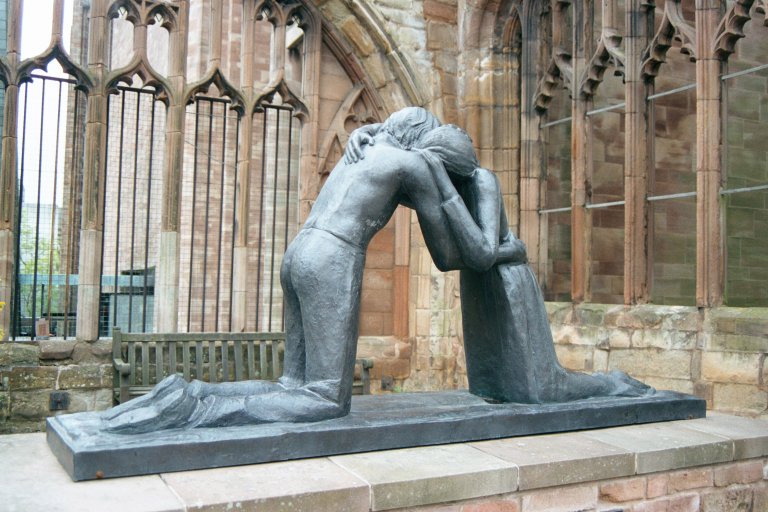 Sin damages our relationships, both with the Divine and with Creation. As foreshadowed in the previous Credo, the damage should be worked upon and we should reconcile ourselves with the Divine and Creation.
Sin damages our relationships, both with the Divine and with Creation. As foreshadowed in the previous Credo, the damage should be worked upon and we should reconcile ourselves with the Divine and Creation.I purposely choose the word reconcile over redemption or atonement and I should say two words on this.
Redemption (and redeemer) comes from the latin root, redemptio, "to buy back, to ransom". The question is begged 'to buy back/ransom from whom? What was gained in the original selling?' Additionally, the common usage of the word today implies the supplicant is fundamentally unworthy of the exchange, an assertion which has been refuted days ago. Atonement (from atone, ME atonen (at-one), poss. L adunare, to unite (ad-unam, at one)) is a great word from an etymological standpoint, but the modern, theological context precludes it as an unprejudiced word. It IS of interest, however, that the word is so commonly used in reference to 'return to one-ness with God'. In contrast, reconcile comes from the latin reconcilare, "to make good again, to bring together again". That is, at the heart, what we are attempting to do, to come to repair our relationship with the Divine and Creation and to reunite with them.
Easy to say, but what are the steps in the reconciliation process?
1. The first part is recognition of the situation. If one does not see the 'problem', then nothing goes further. There are two people who are married but have recently become estranged. A gulf has opened up between them and recognizing that gulf is the first step.
2. The next is acknowledgment of error. One can see that there is a 'situation' but eschew responsibility for an error which precipitated it. This is another stumbling block to coming back together. The gulf between these two people was created by unkind, hateful words said by one of them.
3. Contrition. Going hand in glove with acknowledgment is soulful remorse. This shows not only recognition of the action but also of the results of the action. This remorse should be communicated (if possible) to both the injured party and to the Divine, for the relationships of both are affected. Seeing the pain and suffering caused by the harsh words, the mistaken one feels crappy and wishes they could retract the words. After prayer on the matter, the mistaken one goes to the partner and apologizes for what was said, expressing their remorse for the misdeed.
4. Restitution. This step does not specifically deal with money (though it could), but more strongly deals with the one at fault making concrete steps to restore things. It is the words and feelings of contrition made manifest and should be a positive step to rebuilding the relationship damaged by the error. The two speak at length as to how the speech came about, work towards a mutually agreed way to make things right and derive a method by which the error can be avoided in future.
5. Forgiveness. The last step, it is important to let go of the error and its consequences. One cannot cross a bridge without taking your foot off of the embankment. Further, it is important to understand that the sin/reconciliation process is a vital learning tool and that it is all part of the individual's education. Seeing the sincerity of contrition and the willingness for restitution, the partner forgives the mistaken one for the mistake, reconciling their relationship.
Note the things which are missing. There is not discussion of punishment, retribution or vengeance. These things are beside the point and commonly run counter to the motive behind reconciliation. It is not a forum to punish or 'bring to justice' nor is it about the one who has suffered. It is about the injuring party, their mistakes and their rehabilitation. So, too, it is not about forgetting the error that occurred. Remembering the mistakes of the past is a powerful tool to guide people towards right-minded thoughts, words and deeds.
Reconciliation is a vital tool by which an individual may recognise errors, fix them and learn from the lesson. Further, it is how we, as imperfect people, show our compassion and willingness to maintain relations with those who have erred.
It is also hard, sometimes very much so, but that's all part of the learning process too.
Credo.
No comments:
Post a Comment